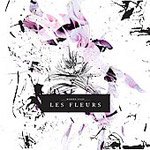The music of Germany’s Marsen Jules’s reflects a world opposite from how we’re told to live in the 21st Century. He’s not trigger-happy, colonizing lands, or into sudden decision-making. In fact, the pacing of Les Fleurs is not unlike a deep-breathing exercise, and this even-tempered music demonstrates a process that would normally seem impossible to cram into short pieces. But Jules is to the point, as he makes time stand still in the form of anti-climactic, five-minute minuets.
Decaying instrumentation doesn’t recall where it came from as much as it becomes its own animate being, and the digitally damaged acoustics on Les Fleurs open the doors to a sonic wasteland where anything/very little can happen. As though he has continually photocopied remnants of a Vibraphone to the point that it’s high contrast and devoid of all definition, Jules’ degenerated sound is as silent as it is audible and gradually comes to life through repetition. Like reciting the same phrase over and over until it becomes meaningless and each tightly rendered syllable takes on a life of its own, Jules hammers away at the same cluster of notes while dramatically skewing its aural implications. The rich overtones in his decays are so prevalent that, like an MC Escher print, it becomes playfully difficult to tell foreground from background.
Artistically, Jules bears the most in common with a sculptor, capturing singularity from every perspective. His process doesn’t always yield typically gratifying results, and more often than not, his patterns simply hang like constellations to be deciphered by his listeners. No, it’s not Lazerium (that’d be too easy) -- his restraint and inclination not to provide too much information at once are admirable, but with it he debunks any notion of expectation. Listening with a close ear or being overly analytical will undoubtedly end in frustration. Conversely, throwing caution to the wind (and/or stealing your younger sibling’s ADD medication) will ultimately help make sense out of the whole thing. Like a more forced version of William Basinski’s Disintegration Loops, Jules relies equally on what’s there and what’s not there, allowing our memory to fill in the blanks. Of course it’s an impossible challenge, but between what’s actually there and what’s not, there’s an inscrutable language waiting to be deciphered.
More about: Marsen Jules

